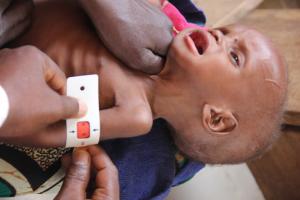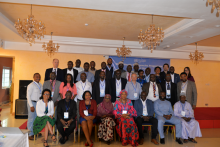WHO Supports one Million malnourished children in North-east Nigeria
Maiduguri, 7 May 2019 - Prior to admission at the World Health Organization (WHO)-supported Stabilization Centre, at Umaru Shehu Hospital, in Maiduguri, Borno state, 2-year old Aminu weighed 5.2kg and measured 8.5cm on mid-upper circumference indicating critical signs of malnutrition with medical complications and required urgent inpatient care. After two weeks of treatment, Aminu is gaining weight and visibly recuperating from his medical complications associated with severe acute malnutrition.
The treatment received by Aminu is part of an intervention by WHO with the support of the Federal Government of Germany and the Nigeria Humanitarian Fund that assisted more than one Million malnourished children in 2018 in North-east Nigeria in response to the malnutrition situation in the region.
Children suffering from severe acute malnutrition like Aminu are nine times more likely to die from related complications than healthy children are. He is one of the estimated 450 000 children who are malnourished in North-eastern region of Nigeria and requiring varying degrees of therapeutic interventions.
Recent nutrition assessment in the three most-affected states of Borno, Adamawa and Yobe states in the region indicate various degrees of malnutrition among children under-5 and pregnant or lactating mothers. While six LGAs (Jakusko, Karasuwa, Machina, Nguru, Yunusari and Yunufari) in Yobe state present a critical rate of global acute malnutrition (GAM) above the 15% emergency threshold, five LGAs in northern Borno (Abadam, Mobbar, Guzamala, Kukawa, and Nganzai) showed between 10-14% GAM.
Generally, 2.7 million women and children in Borno, Adamawa and Yobe states need nutrition support including 310 000 children in need of treatment for severe acute malnutrition (SAM) and 250 000 who suffer from moderate acute malnutrition.
With the support of its partners, WHO has been providing active life-saving medical assistance to the affected children and population. At the 6th Joint Operational Review of its health interventions in the north-east Nigeria, in Abuja, WHO and partners reflected on the achievements and impact of this intervention to date.
In addition to having screened more than one million children for malnutrition in 2018 alone, including nearly 10 000 severely acute malnourished and 40 000 moderately acute malnourished children, WHO and partners are supporting activities to prevent malnutrition, early detection and treatment of malnourished children with medical complications.
From January 2018 to date, WHO has provided 127 Severe Acute Malnutrition kits to 30 stabilization centres across the Borno, Adamawa and Yobe states with which nearly 8 000 children were treated for medical complications.
Collectively, WHO mobile health teams and community resource persons have provided more than 750 000 mothers and caregivers with lifesaving health messages on infant and young child feeding and key household practices for childhood survival. Over 300 health professionals from Borno, Adamawa and Yobe states ministries of health, and NGOs have been trained through WHO’s intensive six-day training course on inpatient management of SAM.
In his opening remarks at the Joint Operational Review meeting in Abuja (April 29-30, 2019), attended by experts from WHO Headquarters, African regional office, and Country Office , along with key national and international partners in the field, the WHO Nigeria Officer-in-Charge, Dr Clement Peter welcomed these achievements.
“Thanks to the support of our partners and our good collaboration with local, state and federal health authorities, the WHO health interventions in the North East has made a real impact in addressing the critical nutrition situation in the region”, Dr Peter says.
However, “more needs to be done by all partners to fully address the situation. This 6th Operational Review of WHO interventions in the north-east Nigeria is opportune as the crisis in the region has rapidly changed in scope and severity with women and children bearing the major brunt of the emergencies,” adds the OiC.
According to him, “It has therefore become essential that we review our strategies and activities to ascertain what has worked, what didn’t work and how to re-strategize for the challenges ahead. WHO calls on all partners to remain mobilized and continue the efforts to provide urgently needed relief to the affected children”.
WHO is grateful to the Federal Government of Germany and to the donors that contributed to the Nigeria Humanitarian Fund for supporting this intervention.




